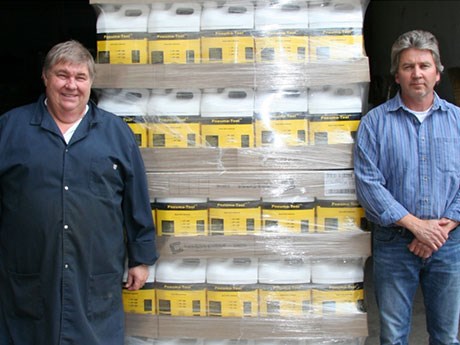Mining contractors question rock drill lubricant procurement practices
The long-standing practice of including rock drill lubricants in the tendering process for fuels and lubricants is being questioned by a growing number of mining contractors and mining company personnel.
Rock drill lubricants, which are used for pneumatically powered jackleg drills, stopers, long toms and raise climbers, are usually lumped together with transmission oils, hydraulic oils, drivetrain lubricants and gear oils in the tendering process.
All of the latter are contained in enclosed systems, noted Keith Klayh of Pneuma-Tool Inc., a North Bay company that holds a patent on a new rock drill lubricant. Rock drill lubricant, on the other hand, is a single pass lubricant, said Klayh.
“The compressed air goes through a lubricator which injects a small amount of oil into the line to lubricate the inner workings of the tool.
“Because the lubricant is directly expelled into the air where the guys are working, it has a direct impact on health and safety. The other lubricants stay contained in the machines and don’t impact the guys, so we’ve made a recommendation to the Ontario Mining Association to remove rock drill lubricants from the bid process, which is driven only by price.”
The Pneuma-Tool product costs more initially, but prolongs tool life and eliminates oil fog, which coats a miner’s lungs and makes it difficult to see.
Pneuma-Tool, co-owned by Klayh and partner Bill Culhane, has succeeded in developing a fiercely loyal following since the introduction of the product in 2010.
Mining contractors
Foremost among them are northeastern Ontario’s three mining contractors – J.S. Redpath Limited, Cementation Canada and Dumas Mining.
The problem, explained Klayh, is that when a mining contractor takes on a contract, the mine supplies the consumables. That forces contractors to use an inferior rock drill lubricant, persuade the mine to supply Pneuma-Tool, or supply it at their own expense.
Pneuma-Tool devotee Gary Gagain oversees J.S. Redpath’s raise climber division, consisting of 52 pneumatically powered raise climbers.
“When we send them up to a place like Raglan or Nunavik (in northern Quebec) and suffer breakdown after breakdown, eventually we have to go to the client and say, ‘Look, you gotta help us out here. We can’t provide you with your raise until we can keep going steady, and to go steady, we need a good oil.’”
Redpath put Pneuma-Tool rockdrill lubricant to the test at Goldcorp’s Red Lake Complex, using it on five raise drill excavations.
Following the test, “we removed the air motors and shipped them to our Timmins office for assessment,” said Gagain. “The mechanics opened them up and discovered they were as good as the day they were new, which was amazing to us. Typically, we would have gone through two or three motors with that amount of raise work.”
Redpath has also introduced Pneuma-Tool to Freeport McMoRan operations in Indonesia and just this summer introduced the product at Vale’s Totten Mine.
Pneuma-Tool is also being used by Kirkland Lake Gold and by several mines in the Timmins camp. Securing a foothold in the rock drill lubricant business has been challenging for a number of reasons, said Klayh.
Oil fog
Generations of miners have put up with oil fog and “nobody questioned it because that’s the way it was.”
Over the years, lubricant manufacturers would come up with new formulations to eliminate it, but tool performance would go down or there were other issues such as icing at the muffler, so customers have heard it all before and are somewhat skeptical.”
Pneuma-Tool is now experimenting with new needle and seed lubricators for more reliable delivery of lubricant into compressed air lines.
The internal mechanism of the conventional, footballstyle lubricator has too much play in it, said Klayh. As the O-rings disintegrate, excess oil enters the line.
“We’ve been working with some new needle and seed lubricators that are giving us real fine control,” he noted. “In one test, a miner drilled 300 feet with a jackleg and used a third of a litre of lubricant. Normally, he figured he would have used one and a half litres.
Lubricator
“The design of the football-style lubricator is 50 years old and there have been very few changes to it. It’s old technology,” said Cullen.
To get around the problem, Pneuma-Tool came up with a higher viscosity formulation that limits excess outflow of lubricant, “but we still know that the way to go is to have a proper lubricator,” said Klayh.
With a growing customer base in northeastern Ontario, Pneuma-Tool is looking forward to building sales in other mining jurisdictions, including South America.
“We had to prove our product in our own backyard first, but fortunately three of the biggest mining contractors in the world are in our backyard and we’ve done our proving with those guys,” said Cullen. “Until six months ago, we were still at the point where we didn’t have enough data or recognition.
Now, we have in excess of 1,000 face-time miners using our product, so this is real. It works. It can’t be denied.”


